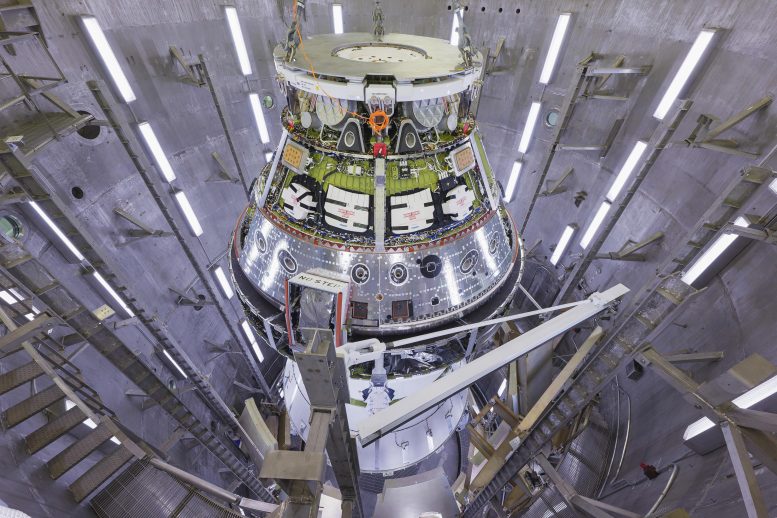Orion Spacecraft to Take a Test Spin in the Vacuum of Space Without Leaving Earth


Technicians used a 30-ton crane to lift NASA’s Orion spacecraft on Friday, June 28, 2024, from the Final Assembly and System Testing (FAST) cell to the altitude chamber inside the Neil A. Armstrong Operations and Checkout building at NASA’s Kennedy Space Center in Florida. The spacecraft, which will be used for the Artemis II mission to orbit the Moon, underwent leak checks and end-to-end performance verification of the vehicle’s subsystems. Credit: NASA
NASA’s Orion spacecraft for the Artemis II mission completed assembly and system tests, including checks for propulsion system leaks. It was tested in a vacuum chamber to replicate the space environment, with data collected to verify its readiness for lunar missions.
Orion Spacecraft’s Final Preparations
NASA’s Orion spacecraft for the Artemis II mission was lifted out of the Final Assembly and System Testing cell on June 28 inside the Neil A. Armstrong Operations and Checkout building at NASA’s Kennedy Space Center in Florida. The integrated spacecraft has been undergoing final rounds of testing and assembly, including end-to-end performance verification of its subsystems and checking for leaks in its propulsion systems.
Electromagnetic and Vacuum Testing
A 30-ton crane returned Orion to the recently renovated altitude chamber where it underwent electromagnetic testing. The spacecraft will now undergo a series of vacuum chamber qualification testing. The tests will subject the spacecraft to a near-vacuum environment by removing air, thus creating a space where the pressure is extremely low. This results in no atmosphere, similar to the one the spacecraft will experience during future lunar missions.
Data Collection and Suit Testing
Testing will span approximately a week, with technicians collecting data from the spacecraft’s chamber, cabin, and environmental control and life support system to test spacesuit functionality. The data recorded during these tests will be used to qualify the spacecraft to safely fly the Artemis II astronauts through the harsh environment of space.



